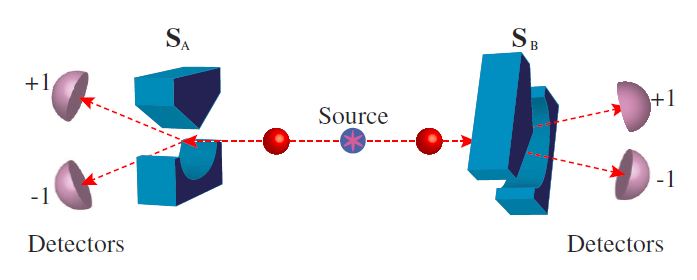A roll of the dice
July 13, 2012

A source emits two spin-half particles traveling to two distant sites where each particle’s spin is measured along directions SA and SB, respectively, using Stern-Gerlach apparatuses. If the particles are initially maximally entangled, then the probability of correctly predicting the result of the measurement on the particle on the left is, according to quantum mechanics, 0.5. (Credit: Terence E. Stuart, Joshua A. Slater, Roger Colbeck, Renato Renner, Wolfgang Tittel/Physical Review Letters)
Quantum theory is close to optimal in terms of its predictive power, say researchers from the Perimeter Institute in Waterloo, the University of Calgary’s Institute for Quantum Information Science, and the Eidgenössische Technische Hochschule (ETH) in Zürich.
But in quantum mechanics, even if all the information is available, the outcomes of certain experiments generally can’t be perfectly predicted beforehand.
This inability to accurately predict the results of experiments in quantum physics has been the subject of a long debate, going back to Einstein and co-workers, about whether quantum mechanics is the best way to predict outcomes.
The new research looks at measurements on members of maximally entangled pairs of photons that are sent into a Stern-Gerlach-type particle deflection apparatus, in which each photon can take one out of two possible paths.
“In our experiment, we show that any theory in which there is significantly less randomness is destined to fail: Quantum theory essentially provides the ultimate bound on how predictable the universe is,” says Wolfgang Tittel, associate professor and GDC/AITF Industrial research chair in Quantum Cryptography and Communication at the University of Calgary.
Renato Renner, professor at the ETH in Zürich adds: “In other words, not only does God ‘play dice,’ but his dice are fair.” (A reference to Einstein’s famous quote, “God does not play dice,” expressing his contempt for the notion that the universe is governed by probability.)
Randomness in quantum theory is one of its key features and is widely known, even outside the scientific community, says Tittel.
“Its appeal is its fundamental nature and broad range of implications: Knowing the precise configuration of the universe at the big bang would not be sufficient to predict its entire evolution, for example, in contrast to classical theory,” he says.